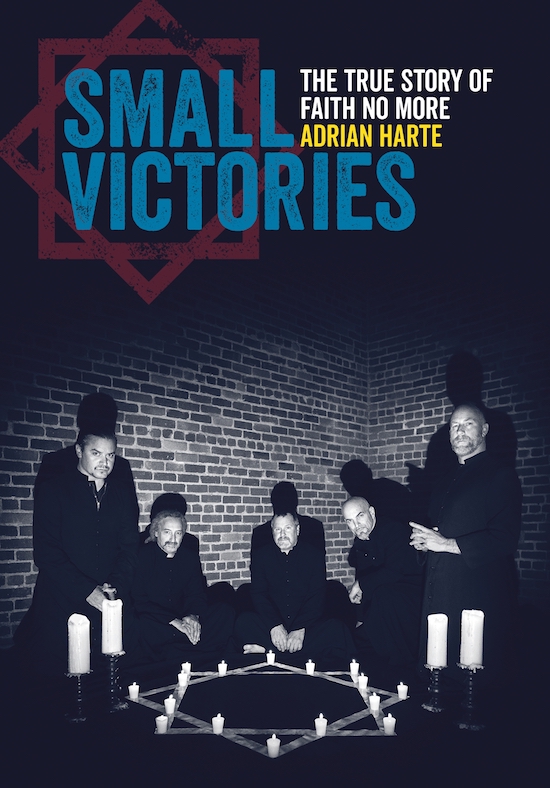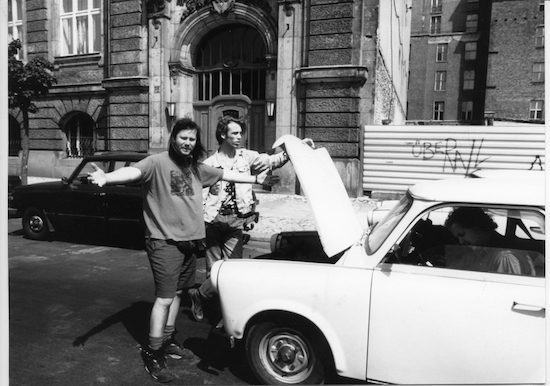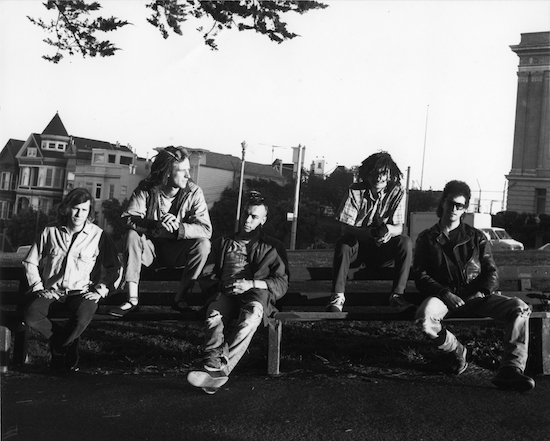Faith No More in 1985. All band shots ((c) Bill Gould/ Faith No More)
The cult of Faith No More has unsurprisingly manifested itself in a large number of dedicated internet sites, but there have been a shocking lack of books so far for such a seminal band. There’s Steffan Chirazi’s out-of-print Faith No More: The Real Story of which I’ve not had the pleasure, though given that it arrived in 1994, it only tells half the story whether real or not. And then there’s also The Faith No More & Mr. Bungle Companion by Greg Preto from 2013 which we’ll come to shortly.
Adrian Harte, who runs the Faith No More 2.0 website, has taken it upon himself to right such wrongs, publishing his account with the excellent music specialist publisher Jawbone Press. If the words “fansite” and “book” are ringing alarm bells then they shouldn’t – Harte has a beautiful turn of phrase, and he’s not afraid to throw in a bit of Hericlitian analysis or namedrop Adorno without sounding too much like a bellend. The text kicks in with a neat coffee metaphor and ends on some tantalising possibilities, and in between there’s pretty much everything you could ever possibly hope to know about Faith No More within its pages. With one caveat, but we’ll come to that one a bit later as well.
In Small Victories: The True Story of Faith No More, Harte has undeniably put the requisite effort in, travelling to California to interview everyone connected with the band that he possibly could, with hundreds more interviews besides. He even quotes our very own Robert Barry on page 161 musing on the possible meaning behind the lyrics to ‘Epic’. It’s as detailed as an oral history, and its 330-odd pages feel like a labour of love, but Harte also has the skills to keep it lean and make this Dostoevskian tale of conflict and subterfuge in the microcosm of a legendary American alternative rock band fly off the page. “The man has done his research and it shows,” said de facto leader Billy Gould. “It provided me with more than a few revelations… and I’m in the band.”
Indeed the revelations come thick and fast, whether it’s learning that Geordie Walker from Killing Joke or random-woman-kicking Queens of the Stone Age frontman Josh Homme both nearly joined as guitarists (there have been 14 in the ranks so far), or that MC Hammer’s ‘Pray’ samples ‘We Care A Lot’. The book also fleshes out the appearance of Courtney Love as lead singer in the mid-80’s – which always felt almost apocryphal up to this point – and offers the tantalising detail that a Love-fronted Faith No More used to cover Van Halen’s ‘Jump’(!) There are also a number of brilliant tales involving Billy Idol, Axl Rose, Milli Vanilli, Chile and Faith No More’s part in the Berlin Wall’s downfall. The book is worth it alone for a laugh out loud Tap-esque retelling of the night the band followed a Black Crowes tribute act in Buffalo and the ensuing gore and Patton porn that very nearly lead to arrests.

Book cover ((c) Jawbone Press)
Faith No More drummer Mike Bordin with Adrian Harte at the Small Victories launch in Dublin earlier this month ((c) Emmet McAviney)
Another factor that makes this version of events essential is the inclusion of so much detail about Chuck Mosley, the band’s erratic, frustrating and yet still somehow loveable former frontman who helped them to early, modest success. That the band were so driven in the early days, despite being “dirty hippies” (Roddy Bottum’s words) may come as an eye-opener, though their progress was oftentimes nobbled by their “self-saboteur” singer (Gould’s words). Harte paints an affectionate picture of Mosley, who died last November after a drug relapse. His contribution is kept to a minimum in The Faith No More & Mr. Bungle Companion (the clue is in the title). What’s more, that previous biography, which I have referenced when writing articles about Faith No More myself, is an enthusiastic but muddled portrait that contains the searing insights of such towering figures as Wes Borland from Limp Bizkit.
Harte addresses Faith No More’s inadvertent influence on the nu-metal movement of the late 90s, and delivers the best riposte I’ve yet read: “It is certainly clear that elements of Faith No More’s various sounds were picked up on by these bands: the brief merging of rap and metal on ‘Epic’; the rhythmic vocal style of ‘Midlife Crisis’; the counterpointing of delicate keyboard chords to chugging riffs throughout. But equally, many of the distinctive elements of nu-metal sounded nothing like Faith No More. Faith No More never employed turntabling: never used detuned guitars; and never wrote deeply personal, emotional lyrics.
“Lyrically and emotionally, Faith No More had no effect on nu-metal. Nu-metal lyrics were powered by anger, resentment and misogyny; Faith No More’s lyrics by mordancy, misery and misanthropy. Nu-metal punched down; Faith No More punched up. Nu-metal lashed out at the world; Faith No More poked it in the eye. But nu-metal musicians fell over themselves in the genre’s heyday to lay bare their debt to Faith No More.”

Bill Gould and Matt Cameron of Soundgarden try to figure out to start Gould’s recently-acquired Trabant on the German leg of the Guns N’ Roses/Faith No More/ Soundgarden tour in May 1992.
Perhaps the only disappointment about this book is the continued silence of Mike Patton on all matters Faith No More, meaning it instead concentrates on the core of the band: Bill Gould, Roddy Bottum and Mike Bordin. It’s often a fucked up dynamic, but essentially these three are the unholy trinity at the heart of everything, and Harte’s focus on them is revealing. Patton’s contribution is made up of previous interviews, but it would have been interesting to get his reminiscences of joining a bunch of “crusty fucking guys” (Gould again) as a fresh-faced 19-year-old baseball fanatic from Bumblefuck, CA. I’ve interviewed Patton twice, and once by email, and each time FNM has been off the menu.
On a number of occasions you get to read members of the band eulogising about his extraordinary abilities, but never the other way round, sadly. “I never heard anyone that close to my face sound that great,” says drummer Mike ‘Puffy’ Bordin. “We were looking to continue to get better and then, all of a sudden, here comes a singer who can literally do anything, even beyond probably what he was aware of at the time. You’ve got no restrictions, you’ve got no limitations.” Bottum is similarly effusive for different reasons: “I believe he has a photographic memory. He has a categorical brain that keeps order and degrees of musical chaos in check. I feel like he never forgets. With that comes a huge sense of confidence. He knows that he’s never wrong. He rarely is… His independence and bullheadedness propels his vision in a remarkable way.”
When I interviewed Chuck Mosley in Paris in October 2016, just over a year before he died, I mentioned the fact Patton wouldn’t talk to me about Faith No More, and he shot back: “Why not?! It’s only the fucking band that made you rich and famous”. That was struck off the record, but it seems less important to protect that information now – besides, he wasn’t hostile to Patton otherwise. While Chuck clearly hadn’t had much sleep the night before, he was right about Patton, though perhaps the Eureka-born man of memory is saving it all for a juicy future autobiography. That’s the only way I envisage this account of Faith No More ever being challenged as the go to version that beautifully captures the bellicosity, the vitality, the surreptitious virtuosity and the inveterate internal hostility that permeated Faith No More 1.0 all the way to their exhausted schism in 1997. But in the meantime, look no further for their incredible true story.
Small Victories: The True Story of Faith No More by Adrian Harte is published by Jawbone Press


